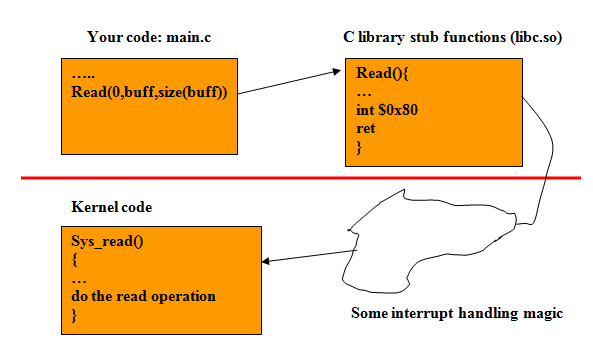| << Chapter < Page | Chapter >> Page > |
rv = read(0,buff,sizeof(buff));
Somewhere, deep down in the operating system kernel, is a function that implements this read operation. For example, in Linux, the routine is called sys_read().
The path from the simple read() function call in your program to the sys_read() routine in the kernel takes you through some interesting and crucial magic. The path goes from your code to a system call stub function that contains a trap or interrupts instruction, to an interrupt handler in the kernel, to the actual kernel function. The return path is similar, with the addition of some important interactions with the process dispatcher.

The system call stub functions provide a high-level language interface to a function whose main job is to generate the software interrupt (trap) needed to get the kernel's attention. These functions are often called wrappers.
The stub functions on most operating systems do the same basic steps. While the details of implementation differ, they include the following:
(1)
set up the parameters,
(2)
trap to the kernel,
(3)
check the return value when the kernel returns, and
(4)
(a)
if no error: return immediately, else
(b)
if there is an error: set a global error number variable (called "errno") and return a value of -1.
Below are annotated examples of this code from both the Linux (x86) and Solaris (SPARC) version of the C library. As an exercise, for the Linux and Solaris versions of the code, divide the code into the parts described above and label each part.
x86 Linux read (glibc 2.1.3)
read: push %ebx
mov 0x10(%esp,1),%edx ; put the 3 parms in registersmov 0xc(%esp,1),%ecx
mov 0x8(%esp,1),%ebxmov $0x3,%eax ; 3 is the syscall # for read
int $0x80 ; trap to kernelpop %ebx
cmp $0xfffff001,%eax ; check return valuejae read_err
read_ret: ret ; return if OK.read_err: push %ebx
call read_next ; push PC on stackread_next: pop %ebx ; pop PC off stack to %ebx
xor %edx,%edx ; clear %edxadd $0x49a9,%ebx ; the following is a bunch of
sub %eax,%edx ; ...messy stuff that sets thepush %edx ; ...value fo the errno variable
call 0x4000dfc0<__errno_location>pop %ecx
pop %ebxmov %ecx,(%eax)
or $0xffffffff,%eax ; set return value to -1jmp read_ret ; return
SPARC Solaris 8
read: st %o0,[%sp+0x44] ! save argument 1 (fd) on stackread_retry: mov 3,%g1 ! 3 is the syscall # for read
ta 8 ! trap to kernelbcc read_ret ! branch if no error
cmp %o0,0x5b ! check for interrupt syscallbe,a read_retry ! ... and restart if so
ld [%sp+0x44],%o0 ! restore 1st param (fd)
mov %o7,%g1 ! save return addresscall read_next ! set %o7 to PC
sethi %hi(0x1d800), %o5 ! the following is a bunch ofread_next: or %o5, 0x10, %o5 ! ...messy stuff that sets the
add %o5,%o7,%o5 ! ...value of the errno variablemov %g1, %o7 ! ...by calling _cerror. also the
ld [%o5+0xe28],%o5 ! ...return value is set to -1
jmp %o5nop
read_ret: retlnop

Notification Switch
Would you like to follow the 'Operating systems' conversation and receive update notifications?